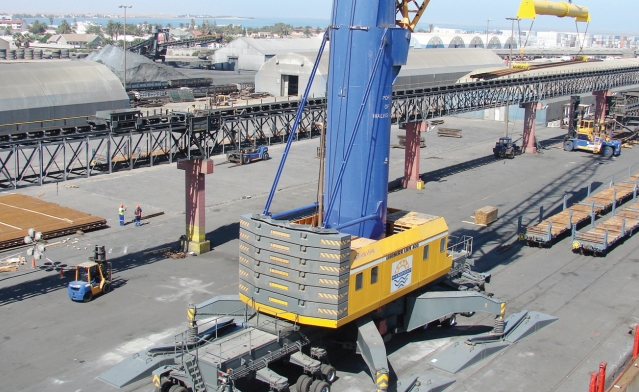Namibia: Namibia sign US$338b loan pact for construction of new Container Terminal -
2013/11/12

AfDB, Namibia sign US$338b loan pact for construction of new Container Terminal - The African Development Bank Group (AfDB) and Namibia have signed a US$338 million pact for a sovereign guaranteed loan for Namibia Ports Authority (Namport) to finance the construction of a container terminal at Walvis Bay New Port.
The AfDB Group approved the construction of the Container Terminal Project in July 2013, in line with its 10-year Strategy and focus on infrastructure development and regional integration,
The Bank as well provided a US$2.3 million grant to the Government of Namibia for logistics and capacity building complementing the port project loan.
Namibia’s Finance Minister and Governor for the Bank, Sara Kuugongwelwa-Amadhila, signed the loan guarantee and grant agreements on behalf the Government in Windhoek.
Namport Chief Executive Officer Bisey Uirab signed the loan agreement on behalf of Namport, while Ebrima Faal, Regional Director of the AfDB’s Southern Africa Resource Centre (SARC), signed for the Bank.
The Project will enable Namport to triple the container-handling capacity at the Port of Walvis Bay from 350,000 Twenty-foot Equivalent Units (TEUs) to 1,050,000 TEUs per annum.
It will as well finance the purchase of up-to-date port equipment and the training of pilots and operators for the new terminal.
The grant component will fund the preparation of the National Logistics Master Plan study, technical support and capacity-building for the Walvis Bay Corridor Group and training of freight forwarders with particular emphasis on female staff.
According to the AfDB Director of Transport and ICT Amadou Oumarou: “Through this project which potentially serves up to seven major economies in the SADC region, the Bank is assisting in the diversification and distribution of port facilities on the southwest coast of Africa, and provides the much-needed alternative for the region’s landlocked nations.”
- Related Articles
-
Routes Africa forum aims to improve African air connectivity
2016/05/15 An event dedicated to the development of the African aviation industry will take place next month in Tenerife (26-28 June) to encourage the launch of new air services to, from and within the African continent. Routes Africa 2016 will help to improve African connectivity by bringing together airlines, airports and tourism authorities to discuss next air services. Around 250 route development professionals are expected to attend the forum which was founded ten years ago to stimulate increase in the industry. -
While Europe is on the verge of breaking up, Africa is reaping the benefits of integrating, growing and developing its trading blocks
2016/05/13 The collapse of virtual borders is one of the majority remarkable things to have happened in our lifetimes. In the world of cyberspace, time and distance have become almost peripheral considerations at the same time as it comes to doing business. Services from software development to accounting can be delivered across the world in the blink of an eye. Next business leaders will struggle to imagine an era at the same time as communication was neither immediate nor virtually free. -
Africa’s economic growth is likely to be slower in the intervening years
2016/05/12 Africa’s economic increase is likely to be slower in the intervening years than in the before decade, according to the new rating by Ernst & Young using a barometer to gauge the level of appeal and success.“The baseline projection of the International Monetary Fund (IMF) for 2016 is presently reduced to 3%, while it was estimated at 6.1% in April 2015″, Ernst & Young points out in its rating. -
Raw materials have long been linked to Africa in many business people’s minds
2016/05/11 Oil, gold, diamonds, palm oil, cocoa, timber: raw materials have long been linked to Africa in a lot of businesspeople’s minds. And in fact the continent is highly dependent on commodities: they constitute as much as 95% of some nations’ export revenues, according to the United Nations Conference on Trade and Development. But propping a country’s entire economy on commodities is risky business, like building a mountainside home on stilts. You can’t be sure about the weather, or in this case the commodities market. The current free-fall of oil prices to less than $40 a barrel is a glaring example. “The commodities cycle has tanked out,” says Austin Okere, founder of Computer Warehouse Group (CWG), a Nigerian emerging multinational financial services company. “And this time it looks additional structural than cyclical, so it’s not a matter of waiting it out. Something has to give.” -
Namibia: FNB Housing Volume and Value Index Retreated
2016/02/08 In the new FNB housing index Daniel Kavishe, Market Research Manager, FNB Group advises that the FNB volume and price index retreated in the eve of the fourth quarter 2015 as the housing market eased across the country. He added that the deeds office recorded a 40% drop in transactions year-on-time(y-o-y) due to a slowdown in purchases in the Northern and Central town. Transaction increase at the Coast remained steady at 10% y-o-y supported by development in Swakopmund while in the South, transactions at Luderitz doubled due to the low cost developments in Luderitz's Benguela area.
-
- Namibia News
-
- BOTSWANA: Routes Africa forum aims to improve African air connectivity
- BOTSWANA: Economic integration is helping boost trade and investment in Africa
- BOTSWANA: Africa’s economic growth is likely to be slower in the intervening years
- BOTSWANA: Beyond Commodities: How African Multinationals Are Transforming
- NAMIBIA: Namibia: FNB Housing Volume and Value Index Retreated
- BOTSWANA: Africa,Protect Refugees With Mobile Banking
- Trending Articles
-
- BAHAMAS: Brand New Residences Bring Modern Luxury Living to Paradise Island Bahamas
- WORLD: Mobilizing Education for Global Health
- CHINA: Support from China for the industrialisation of Angola and Mozambique
- INDONESIA: Empowering Young Women Through Farming in East Nusa Tenggara
- AFRICA: sustainable Housing for Rural Families in Africa
- EGYPT: Egyptian investment firm Qalaa Holdings is confident its new refinery




.gif?1356023993)



